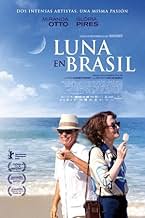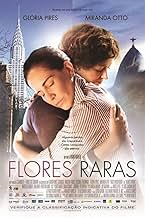IMDb RATING
7.0/10
3.7K
YOUR RATING
A chronicle of the tragic love affair between American poet Elizabeth Bishop and Brazilian architect Lota de Macedo Soares.A chronicle of the tragic love affair between American poet Elizabeth Bishop and Brazilian architect Lota de Macedo Soares.A chronicle of the tragic love affair between American poet Elizabeth Bishop and Brazilian architect Lota de Macedo Soares.
- Awards
- 9 wins & 21 nominations total
Featured reviews
Reaching for the Moon is the kind of movie everyone hopes for but no one makes: a gay romance where "gay romance" is not the premise. Director Bruno Barreto focuses instead on how Elizabeth Bishop and Lota de Macedo Soares challenged and changed the world and each other in other ways, and that was absolutely the right choice - these women and their story are fascinating and make for top class entertainment.
And it is entertaining. Considering the characters' issues and the story's ending it could have been drab, but the film is always lively and engaging. It flies by. Bishop takes herself very seriously, but Barreto maintains a sense of humor about it and makes fun of her just enough to keep her melodrama under control. An added bonus is that Miranda Otto gets to show off her underrated and underused comedic chops; one particular drunk scene is priceless. Glória Pires is dynamic and fiery as Lota but Otto is the real star, channeling Greta Garbo and Deborah Kerr in a gracefully commanding performance. She doesn't shy away from Bishop's spikiness, but her screen presence is so compelling that as much as we might be frustrated with her character, we can't take our eyes off her. Thanks to her constantly surprising performance, an eclectic ensemble cast, breathtaking visuals, and assured direction, Reaching for the Moon pulses with energy and is a breath of fresh air in an era of stuffy and bland biopics.
Highlights: Shots of Rio de Janeiro that belong on postcards; a performance from Miranda Otto that would have won an Oscar in 1937; the assertion that some things are more important than whether a person is gay
Verdict: Watch this with your parents instead of Blue Is the Warmest Color
And it is entertaining. Considering the characters' issues and the story's ending it could have been drab, but the film is always lively and engaging. It flies by. Bishop takes herself very seriously, but Barreto maintains a sense of humor about it and makes fun of her just enough to keep her melodrama under control. An added bonus is that Miranda Otto gets to show off her underrated and underused comedic chops; one particular drunk scene is priceless. Glória Pires is dynamic and fiery as Lota but Otto is the real star, channeling Greta Garbo and Deborah Kerr in a gracefully commanding performance. She doesn't shy away from Bishop's spikiness, but her screen presence is so compelling that as much as we might be frustrated with her character, we can't take our eyes off her. Thanks to her constantly surprising performance, an eclectic ensemble cast, breathtaking visuals, and assured direction, Reaching for the Moon pulses with energy and is a breath of fresh air in an era of stuffy and bland biopics.
Highlights: Shots of Rio de Janeiro that belong on postcards; a performance from Miranda Otto that would have won an Oscar in 1937; the assertion that some things are more important than whether a person is gay
Verdict: Watch this with your parents instead of Blue Is the Warmest Color
I was sad to see this deeply moving, complex and intelligent story of the love between the award winning American poet Elizabeth Bishop and Brazilian architect Lota de Macedo Soares. so overlooked by U.S, audiences and critics. There are two outstanding performances by Miranda Otto as the outwardly shy and repressed alcoholic Bishop, and Gloria Pires as her opposite, an extroverted, highly emotional woman who coaxes Bishop out of her shell.
Very nicely photographed, this reminded me of the best of the Merchant-Ivory films. It's not flashy. Indeed there's a quiet to it that is needed to off-set the melodramatic (even if based in truths) elements of these women's lives. But that doesn't keep it from packing a hell of an emotional punch, and in being bold enough to create characters we care for, but who are also deeply troubled and capable of making bad choices – just like in the real world of relationships we rarely see on screen. It was also nice to see a gay-themed love story that both acknowledged how difficult being homosexual was in the 1950s, while not becoming a film about that only. This is a film about a complex relationship between two highly creative and wounded souls who both save and damage each other. The fact that both are women is only a small part of the larger story. It's also one of the only films I've seen capture at least a taste of the struggle and loneliness of the act of writing.
One of those little gems that deserves to be discovered by more people.
Very nicely photographed, this reminded me of the best of the Merchant-Ivory films. It's not flashy. Indeed there's a quiet to it that is needed to off-set the melodramatic (even if based in truths) elements of these women's lives. But that doesn't keep it from packing a hell of an emotional punch, and in being bold enough to create characters we care for, but who are also deeply troubled and capable of making bad choices – just like in the real world of relationships we rarely see on screen. It was also nice to see a gay-themed love story that both acknowledged how difficult being homosexual was in the 1950s, while not becoming a film about that only. This is a film about a complex relationship between two highly creative and wounded souls who both save and damage each other. The fact that both are women is only a small part of the larger story. It's also one of the only films I've seen capture at least a taste of the struggle and loneliness of the act of writing.
One of those little gems that deserves to be discovered by more people.
This is a beautifully filmed movie about the lives of two exceptional women whose lives collided in the early 50s and went on for 17 years. Oh - it's a true story, BTW.
The locations are spectacular in a quiet way and worth the watch on their own. They added one star.
I am ashamed to say I was not aware of Elizabeth Bishop. Now I am looking forward to reading her material.
Hope you enjoy this film.
The locations are spectacular in a quiet way and worth the watch on their own. They added one star.
I am ashamed to say I was not aware of Elizabeth Bishop. Now I am looking forward to reading her material.
Hope you enjoy this film.
The Brazilian movie Flores Raras was shown in the United States with the title Reaching for the Moon (2013). It was directed by Bruno Barreto.
The film is based on the life of the great American poet, Elizabeth Bishop (Miranda Otto). As the movie begins, Elizabeth is traveling in Brazil, and visits the estate of the famous architect Lota de Macedo Soares, played by Glória Pires. Lota is in a lesbian relationship with Bishop's college friend Mary (Tracy Middendorf).
Despite Elizabeth's somewhat proper and restricted outlook, she accepts the love offered by Lota, even though this leaves Mary as the odd woman out. This act struck me as a shabby betrayal of an old friend, but, in the movie, it's treated as true love that makes such betrayal acceptable, if not inevitable.
It doesn't hurt that Lota has an enormous estate, and enormous resources. As an architect, Lota is able to envision and then design a beautiful writer's studio for Elizabeth.
The strong point of the movie is that it presents the writing of poetry as work. Elizabeth doesn't just close her eyes and wait until the poetic muse strikes her. She sits in the studio and pushes and pulls her poetry into shape. She's also not happy when she's interrupted during the creative process. This is the only film I can remember where creating a poem is shown as a process, and a delicate and difficult process at that.
This idyllic existence is disrupted by Brazilian political events, into which Lota plunges. The remainder of the movie is devoted to how these events play out in the lives of Elizabeth and Lota.
I don't know enough about the details of the coup, or of the lives of the film's principals, to know how accurately the film portrays them. This aspect of the movie is highly melodramatic, but the actual events were probably equally melodramatic. Certainly, the film holds your interest as the situation plays itself out to the end.
We saw this movie on the large screen, where it will work better, especially in the scenes set on Lota's estate. However, it will work well enough on the small screen. It's not a great movie, but it's certainly good enough to repay you for finding and watching it.
The film is based on the life of the great American poet, Elizabeth Bishop (Miranda Otto). As the movie begins, Elizabeth is traveling in Brazil, and visits the estate of the famous architect Lota de Macedo Soares, played by Glória Pires. Lota is in a lesbian relationship with Bishop's college friend Mary (Tracy Middendorf).
Despite Elizabeth's somewhat proper and restricted outlook, she accepts the love offered by Lota, even though this leaves Mary as the odd woman out. This act struck me as a shabby betrayal of an old friend, but, in the movie, it's treated as true love that makes such betrayal acceptable, if not inevitable.
It doesn't hurt that Lota has an enormous estate, and enormous resources. As an architect, Lota is able to envision and then design a beautiful writer's studio for Elizabeth.
The strong point of the movie is that it presents the writing of poetry as work. Elizabeth doesn't just close her eyes and wait until the poetic muse strikes her. She sits in the studio and pushes and pulls her poetry into shape. She's also not happy when she's interrupted during the creative process. This is the only film I can remember where creating a poem is shown as a process, and a delicate and difficult process at that.
This idyllic existence is disrupted by Brazilian political events, into which Lota plunges. The remainder of the movie is devoted to how these events play out in the lives of Elizabeth and Lota.
I don't know enough about the details of the coup, or of the lives of the film's principals, to know how accurately the film portrays them. This aspect of the movie is highly melodramatic, but the actual events were probably equally melodramatic. Certainly, the film holds your interest as the situation plays itself out to the end.
We saw this movie on the large screen, where it will work better, especially in the scenes set on Lota's estate. However, it will work well enough on the small screen. It's not a great movie, but it's certainly good enough to repay you for finding and watching it.
Lovely. A story here that is not overshadowed by the relationships, politics, or agenda. It is, simply beautifully filmed, the beaches of Rio De Janeiro, the beautiful home Lota has deigned in part to accommodate her new lover, poet Elizabeth Bishop, completely played by Miranda Otto.
Otto is at once restrained yet yearning, a Vassar graduate visiting her friend, who initially is puzzled (and indeed overwhelmed) by the beauty and passion of South America.
She plays the American New England spinster type well, without a stereotype here. We can feel she wants, and NEEDS to break free from societal restraints.
The filming of the rain forests, the owls at night, the visuals are incredible. Lota Soares was politically connected and designed the park near Carioca beach, the title infers, reaching for the moon has so may more connotations for each woman.
What is most refreshing is the way this film is written, sensitive to the issues each woman experiences, it is an individual and a private journey.
The actress portraying Carlotta Soares is affecting and sad, and Miranda Otto is quite believable as Bishop. The story is beautiful and sad, and the scenery of Brazil is not to be missed, simply beautiful, and beautifully filmed. 10/10
Otto is at once restrained yet yearning, a Vassar graduate visiting her friend, who initially is puzzled (and indeed overwhelmed) by the beauty and passion of South America.
She plays the American New England spinster type well, without a stereotype here. We can feel she wants, and NEEDS to break free from societal restraints.
The filming of the rain forests, the owls at night, the visuals are incredible. Lota Soares was politically connected and designed the park near Carioca beach, the title infers, reaching for the moon has so may more connotations for each woman.
What is most refreshing is the way this film is written, sensitive to the issues each woman experiences, it is an individual and a private journey.
The actress portraying Carlotta Soares is affecting and sad, and Miranda Otto is quite believable as Bishop. The story is beautiful and sad, and the scenery of Brazil is not to be missed, simply beautiful, and beautifully filmed. 10/10
Did you know
- TriviaFour paragraphs appear between the end of the film and the beginning of the credits.
1. "Few women write major poetry. Only four stand with our best men: Emily Dickinson, Marianne Moore, Elizabeth Bishop and Sylvia Plath." - Robert Lowell
2. "I'd rather be called the 'The 16th Poet' with no reference to my sex, than one of 4 women - even if the other three are pretty good." - Elizabeth Bishop
3. Elizabeth Bishop died in 1979 in the United States. She is considered on the most important poets of the English language.
4. In 2012, UNESCO declared the city of Rio De Janeiro a World Heritage site. The Flamengo Park is one of its main attractions.
- GoofsOpening in 1951 but Bobby Vinton singing Blue Velvet was not until 1963.
- Quotes
Elizabeth Bishop: It's OK. I'm not drunk. I'm just crying in English.
- Crazy creditsNine of the main performers (the first 10) are listed in the credits without the name of their character. Only Treat Williams is credited as his character, Robert Lowell.
- ConnectionsReferenced in Programa do Jô: Episode dated 26 August 2013 (2013)
- How long is Reaching for the Moon?Powered by Alexa
Details
- Release date
- Country of origin
- Official sites
- Languages
- Also known as
- Fleurs rares
- Filming locations
- Production companies
- See more company credits at IMDbPro
Box office
- Gross US & Canada
- $45,502
- Opening weekend US & Canada
- $14,573
- Nov 10, 2013
- Gross worldwide
- $1,534,391
- Runtime1 hour 58 minutes
- Color
- Aspect ratio
- 1.85 : 1
Contribute to this page
Suggest an edit or add missing content



























